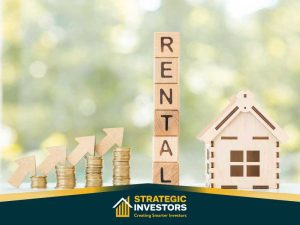
Looking to start an investment in property?
This guide lays out the fundamentals and directs you towards making savvy choices for your financial future. From goal setting to property selection, learn what it takes to succeed.
Get practical advice, without the fluff, on how to secure and grow your real estate investments.
Key Takeaways
- Successful property investment begins with setting clear goals, understanding market dynamics, and consulting experts, while focusing on capital growth and rental income as key profit drivers.
- There are various property types for investment, such as residential homes, apartments, commercial properties, and land, each with unique benefits, challenges, and factors influencing their profitability.
- Effective property investment management includes securing financing through methods like mortgages and leveraging property equity, and involves careful management of tax implications and risk mitigation strategies.
Understanding Property Investment Basics

Knowing your destination (your investment goals) and understanding the landscape (the property market) are critical first steps that can set you on the path to success in your real estate investment journey. Consulting with a real estate agent can provide valuable insights into this process.
Capital Growth vs. Rental Income
A key concept in property investment is understanding the difference between capital growth and rental income. Think of capital growth as the potential increase in the value of your property over time – it’s like watching your money grow on a tree, with each passing year adding another branch of value.
On the other hand, rental income is the regular cash flow you receive from tenants renting your rental property. It’s akin to the fruits borne by your money tree, providing a steady stream of income to complement the growing value of your tree. Both are crucial components of a successful property investment strategy.
Location: The Key to Success
If property investment is a journey, then choosing the right location is the compass that guides you towards success. Just as you would carefully select the location of your vacation hotel based on its proximity to attractions, transportation, and amenities, you must consider similar factors when investing in property. Factors like accessibility to amenities, transportation, and safety can significantly impact the potential for capital growth and rental yield of your investment.
After all, you wouldn’t want to buy a property in the middle of nowhere, would you?
Types of Investment Properties

- Residential homes
- Apartments
- Commercial properties
- Land
Each type presents its unique set of advantages and challenges.
Let’s delve into each of these property types to help you make an informed decision.
Residential Homes
Investing in residential homes is like buying your favorite candy bar – it’s a familiar and comforting choice. Residential properties, like your favorite candy, can bring a reliable source of pleasure (or in this case, revenue). Moreover, these properties give you the freedom to control aesthetics and choose who gets to live in them, much like how you have the freedom to enjoy your candy bar however you like. However, just as too much candy can lead to a toothache, investing in residential homes comes with its challenges, such as the significant initial capital investment and ongoing maintenance costs.
Apartments and Units
If residential homes are like your favorite candy bar, then investing in apartments and units is like venturing into the world of gourmet chocolates. These properties offer a more sophisticated and potentially lucrative investment opportunity, with the potential for steady passive income and capital gains. Much like gourmet chocolates that come in exquisite packaging, apartments can be made more attractive to tenants with modern appliances and new fixtures. However, just as gourmet chocolates come with a higher price tag, the initial investment costs for purchasing an apartment can be quite high.
Commercial Properties
Commercial properties, on the other hand, are like investing in a whole candy factory. They offer the potential for higher rental yields and longer lease terms, making them an attractive investment option for those who can handle the initial capital investment. However, much like owning a factory, commercial properties come with their unique set of challenges such as longer vacancy periods and intricate lease negotiations.
Land Investments
Finally, property investments, particularly in land, are like planting a seed to grow your candy tree. They offer a lower-cost entry into the property market and hold the potential for significant appreciation over time. However, like growing a tree, they require patience and the right conditions (or location) to thrive.
In metropolitan areas, the scarcity of available plots and potential legal disputes, which may involve legal fees, can present challenges to land investors.
Financing Your Property Investment

These include mortgages, home equity loans, and private lenders, each with their unique set of benefits and challenges.
Mortgages
Mortgages are like using a credit card to buy your candy. They allow you to borrow a large sum of money to purchase your property while paying it back in manageable monthly installments. However, just like a credit card, mortgages come with interest rates, and these can significantly impact the cost of your investment over time.
Therefore, it’s crucial to understand the terms of your mortgage and plan your finances accordingly.
Home Equity Loans
Home equity loans, on the other hand, are like using the money you saved in your piggy bank to buy your candy. If you already own a home, you can borrow against its value to finance your property investment. This can be a cost-effective way to fund your investment due to typically lower interest rates. However, just like breaking your piggy bank, you’ll be tapping into your existing assets, which may not always be the best strategy depending on your financial situation.
Private Lenders
Finally, private lenders are like borrowing money from a wealthy friend to buy your candy. They offer more flexibility and faster approval times, which can be beneficial if you need to secure your investment quickly. However, just like borrowing from a friend, using private lenders can be costly due to higher interest rates.
Managing Your Investment Property

Property Management
Hiring property managers can provide several benefits, including:
- Protecting your investment
- Ensuring your property is well-maintained
- Finding and managing tenants
- Handling day-to-day operations
- Providing a steady return on your investment, considering property management fees
This can relieve you from the stress of managing your property and allow you to focus on other aspects of your life or business.
Maintenance and Repairs
Maintaining your property is like keeping your candy in a cool, dry place. It ensures your investment retains its value and keeps your tenants (or candy consumers) satisfied. Neglecting maintenance and repairs can lead to a decline in your property’s value and potential legal issues.
Maximizing Rental Income

Navigating Tax Implications and Deductions

This section will explore the tax implications of rental income and capital gains tax, as well as the various tax deductions available to property investors.
Tax Implications
The tax implications of property investment are like the sales tax on your candy purchase. You’ll need to declare your rental income as income and pay tax on it. If you make a profit from selling your property, you may also have to pay Capital Gains Tax.
However, just as you might get a discount for buying candy in bulk, you may be eligible for a Capital Gains Tax discount if you’ve owned your property for at least one year.
Tax Deductions
On the flip side, tax deductions are like the discounts you can get on your candy purchase. They can significantly reduce your tax bill and increase your overall return on investment. You can claim tax deductions for various expenses related to your property investment, including interest on mortgages, depreciation, and property management expenses.
Mitigating Risks in Property Investment

This section will delve into the different types of risks involved in property investment and how to mitigate them.
Market Risks
Market risks, such as those in the stock market, are like the risk of your candy melting if you leave it out in the hot sun. They refer to the impact of economic conditions and market fluctuations on your property investment. Being aware of these risks and making informed decisions can help protect your investment. Some common market risks include:
- Economic downturns
- Changes in interest rates
- Inflation
- Changes in supply and demand
- Market volatility
By understanding and managing these risks, you can minimize the potential negative impact on your investment.
Liquidity Risks
Liquidity risks are like the risk of not being able to sell your candy quickly and easily. They refer to the challenges of converting your real estate assets into cash. Having a prudent liquidity management strategy can help mitigate this risk.
Interest Rate Risks
Interest rate risks are like the risk of the price of your candy suddenly increasing. They refer to the impact of fluctuating interest rates on your property investment’s cash flow and profitability. Understanding these risks and planning your finances accordingly can help protect your investment.
Building a Diversified Property Portfolio

This section will discuss the importance of having a diversified property portfolio and strategies for achieving it.
The Importance of Diversification
The importance of having a diversified property portfolio is like the importance of having a variety of candies in your candy stash. Having a variety of property types in your portfolio can help spread the risk and ensure you’re not overly reliant on a single property’s performance.
Strategies for Diversification
Diversifying your property portfolio is like adding different types of candies to your candy stash. By investing in a variety of property types across multiple geographic locations and sectors, you can ensure a more diversified portfolio, which can help protect your investment.
Summary
In summary, property investment is a complex but rewarding journey. Just like navigating a candy store, it requires careful planning, informed decisions, and a keen understanding of the market. With the right strategies and tools, you can successfully navigate the property investment landscape and build a profitable portfolio. So go forth and conquer the property market, one investment at a time!
Frequently Asked Questions

Is it a good idea to buy an investment property?
Yes, buying an investment property can be a good idea as it can help build wealth, provide tax benefits, and offer stability as a long-term investment. It’s a way to improve cash flow and secure your future.
How to invest in property with $1,000?
You can invest in property with $1,000 through real estate investment trusts (REITs), fractional investing, renting out spare space, or seeking dollar bargains. These options are suitable for beginners and may provide opportunities to enter the property market with a limited budget.
How much deposit do I need for investment property?
You’ll typically need a 20% deposit to buy an investment property to avoid paying lenders mortgage insurance (LMI). This can come from your savings or equity from your existing home.
What is capital growth in property investment?
Capital growth in property investment refers to the increase in the market value of your property over time, making it a key measure of return on your investment.
Why is location important in property investment?
Location is important in property investment because it affects capital growth and rental yield by influencing accessibility to amenities and transportation, which in turn impacts the potential of your investment.













